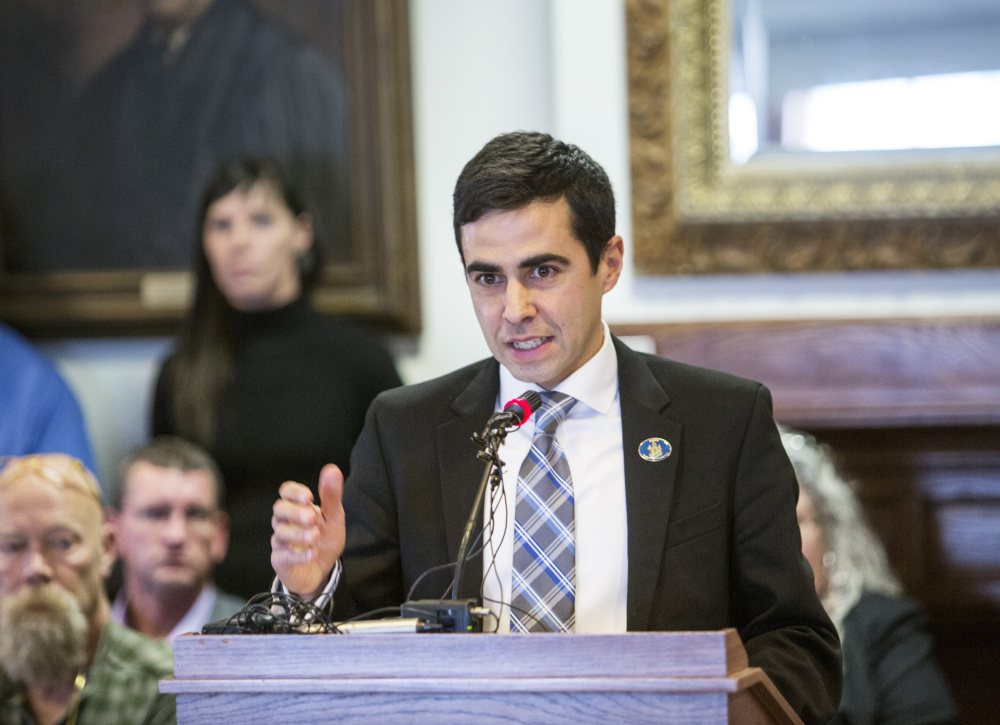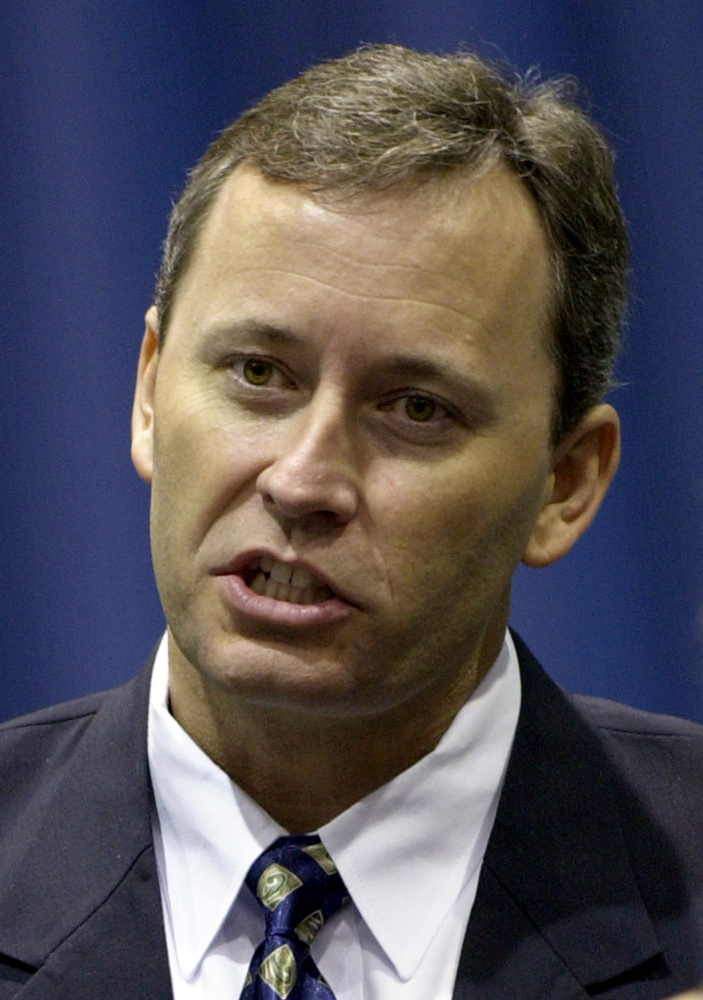AUGUSTA — A pair of Maine lawmakers say they may try a first-of-its-kind legislative maneuver to stop a controversial referendum effort to authorize a casino in York County.
The plan calls for the Legislature to pass into law and then immediately repeal a citizen initiative that would give its backers exclusive rights to build what would be the state’s third casino.
The move, if successful, would quash any vote on the casino this November and set back to square one the secretive group of investors and political operatives with ties to gambling entrepreneurs.
The lawmakers behind the strategy, Senate Majority Leader Garrett Mason, R-Lisbon, and Rep. Louis Luchini, D-Ellsworth, said it may be a long shot, but they feel the ballot question is an extreme abuse of the state’s citizen initiative process. They say the effort was deceptive about who is behind it and who would benefit, and cited the fact that it’s written in such a way that it would allow only casino entrepreneur Shawn Scott or his associates to operate slot machines or a casino in York County.
“If we don’t stop some of these types of referendums in the Legislature, they are going to get more and more and more extreme,” Mason said. “We as a Legislature have to decide when are we going to take our role as the people’s representatives seriously.”
Luchini said he’s so concerned with what he sees as voter deception that he wants lawmakers “to put all the options on the table.” If the Legislature could be successful in killing the casino, it will send a message to others who might seek to exploit the state’s ballot question process for personal gain, he said.
“We are just looking at all of our potential options, and enact and then repeal is one that came up,” Luchini said. “While it has all just been informal talks, it is one I am open to.”
Scott was also the man behind the 2003 referendum that led to Maine’s first combination horse racetrack/slots casino, or “racino,” in Bangor. Soon after the 2003 ballot measure passed, Scott sold his rights to the casino for an estimated $53 million. The value of a license for a southern Maine casino has been estimated to be at least $150 million based on the $160 million the license for Maine’s second casino, in Oxford, sold for in 2013.
The initiative that is now headed toward a November referendum includes language limiting applications for the casino license to “an entity that owned in 2003 at least 51 percent of an entity licensed to operate a commercial track in Penobscot County.”
A CONTROVERSIAL REFERENDUM
That language is what would give Scott and his associates exclusive rights to the York County project, although it’s not clear what entities are financing the initiative and who owns them.
With the citizen petitions certified, it is now up to the Legislature to either enact the proposal or send it to voters for a statewide referendum in November. It has been widely expected that the Legislature would send it to the voters, as it has with similar initiatives in the past.
The ballot question push is backed by a committee called Horseracing Jobs Fairness. The group has so far spent at least $4 million gathering voter signatures in an effort that took nearly two years and has been fraught with complications, controversy and a stream of unending scrutiny from lawmakers and the Maine Ethics Commission, which regulates campaign finance in the state.
Horseracing Jobs Fairness initially listed Lisa Scott, Shawn Scott’s sister, as the sole donor to the ballot initiative effort. But amended disclosure filings, ordered by the ethics commission, show the money came from Lisa Scott and several other donors who gave money to her. Lisa Scott then listed the donation as if she had contributed all the funds.
Multiple phone calls and email messages from the Maine Sunday Telegram to the Scotts, a lobbyist working for the campaign and one listed as the campaign’s treasurer have all gone unreturned.
Luchini and Mason, who co-chair the Legislature’s Veterans and Legal Affairs Committee, which has jurisdiction over casino gambling in Maine, have been trying to learn more about how the campaign is being bankrolled, as well as discover who is actually behind the push.
So far they’ve had little luck. A lobbyist who first testified he was hired by one of Shawn Scott’s companies, Bridge Capital, later recanted his testimony in writing, saying he was mistaken and that he was actually working for a company called Universal Capital. He also said he didn’t actually know who owned Universal.
Luchini and Mason have asked the ethics commission to launch its own probe into the backers of the ballot question.
Mason said the casino ballot question is the most blatant example of why Maine’s referendum process needs to be overhauled.
The idea of enacting and then repealing the ballot question would need the support of not only most of the Legislature, but also Republican Gov. Paul LePage. LePage would have to sign the initiative into law for the Legislature to repeal it.
“The governor would have to be willing to play ball with that,” Mason said.
LePage has previously said he doesn’t see casino gambling as real economic development and that a third casino is too many. And he has bemoaned how easy it is to get a ballot question before voters, noting that the measures are often bankrolled by special-interest groups from outside of Maine.
But LePage has also said in the past that voters should be allowed to decide casino questions.
A message to LePage’s office seeking comment Friday went unreturned.
‘THEY WERE NOT TRUTHFUL’
Mason said he knows an enact-and-repeal strategy may be hard to sell to LePage and lawmakers on both sides of the aisle who are reluctant to be seen as usurping the rights of voters to decide.
But he also said the way the casino measure got on the ballot was deceptive and that, if successful, the York County casino would likely only take customers and business from the state’s other two casinos while making a handful of individuals extremely wealthy.
“They were not truthful with Maine voters when they were hustling those signatures, and maybe this deserves a response that is equally as measured,” Mason said.
He said those collecting voter signatures for the ballot were promised benefits that the casino will never deliver because there’s no guarantee of revenue for harness racing or other public uses.
“This is not the will of the voters, this is the will of 62,000-and-change people, who signed this petition, who I would highly doubt even 1 percent of whom, actually read what they were signing. They were promised this would help horse racing, this would help education and every other carrot that was hung out there. This is not the will of the voters yet,” Mason said.
The casino initiative appears to have little, if any, support in the Legislature, or among the governor and constitutional officers. But not everyone thinks the enact-and-repeal maneuver would work, or that it’s even worth trying.
Secretary of State Matt Dunlap said the idea of the Legislature enacting and then immediately repealing a ballot question, if done, would probably end up being challenged in the courts and may be found unconstitutional.
“The court might say, ‘That’s a little bit too cute by half,’ ” Dunlap said. “The supreme court might frown on that. It’s not clear in the constitution whether they could do something like that in the same legislative session.”
‘PEOPLE GET TO DECIDE’ REFERENDUMS
Also not sold on the idea are Democratic leaders in the Maine Senate.
Senate Minority Leader Troy Jackson, D-Allagash, said he wouldn’t support the enact-and-repeal strategy as a way to dispatch ballot questions the Legislature disagrees with.
“That’s not something I really have any interest in doing,” Jackson said. “It certainly seems to fly in the face of good government. I don’t know if it’s possible, but it’s not something I have any interest in doing.”
Jackson said if the maneuver could be used on the casino ballot question, it could be used on any ballot question, including initiatives that members of a minority party might support. Meaning that if the Legislature and the governor’s office were controlled by a single party, they would have the power to simply veto ballot questions, keeping them from voters.
“If we have one bad apple that tried to pull the wool down over the people’s eyes, that’s unfortunate,” Jackson said. “But I’m very concerned about what that could mean for all the referendums that people worked hard on and were legitimate.”
He said he agreed there was concern about the way the southern Maine casino question ended up going to the voters, but he isn’t convinced voters won’t figure it out.
“People get to decide on referendums, and certainly if this is a bad referendum people will decide and turn it down,” Jackson said.
The casino campaign’s first effort to be certified for the ballot in 2016 was rejected after Maine’s secretary of state determined that only 35,518 signatures of the 91,294 that were submitted could be confirmed to be from actual registered Maine voters. The campaign then resubmitted a new batch of voter signatures this January that made the threshold of at least 10 percent of the number of voters who participated in the last gubernatorial election, or just over 62,000 signatures.
But the ballot committee likely violated Maine campaign finance laws by failing to accurately disclose who funded the $4.3 million petition drive to put the proposal to state voters, according to the ethics commission’s executive director, Jonathan Wayne. And the ballot question committee running the campaign could face fines nearly equal to the amount it has already spent, Wayne has noted.
Scott Thistle can be contacted at 791-6330 or at:
sthistle@pressherald.com
Twitter: thisdog
Send questions/comments to the editors.






Comments are no longer available on this story